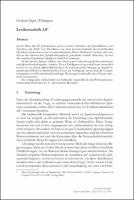Chapter Lexikostatistik 2.0*
Author(s)
Jäger, Gerhard
Collection
European Research Council (ERC); EU collectionLanguage
GermanAbstract
In the middle of the 20th century there were various attempts to classify
Languages with the help of word lists that correspond to the basic vocabulary of the relevant
Languages are taken to automate. These methods have been and are being critically discussed in historical linguistics since
The results obtained often proved to be faulty.
In recent years, we are experiencing a new upswing lexicostatistically
and glottochronological approaches. Their chances of success are essential today
better than half a century ago, as we now have large amounts of comparative data available in electronic form, and computational linguistics and bioinformatics provide powerful tools for statistically evaluating these data.
This article presents a case study illustrating the potential of lexicostatistical methods in the 21st century. In der Mitte des 20. Jahrhunderts gab es diverse Versuche, die Klassifikation von
Sprachen mit Hilfe von Wortlisten, die dem Grundvokabular der betreffenden
Sprachen entnommen sind, zu automatisieren. Diese Methoden wurden und werden in der historischen Sprachwissenschaft gemeinhin kritisch diskutiert, da sich
die erzielten Ergebnisse häufig als fehlerhaft erwiesen.
In den letzten Jahren erleben wir einen neuen Aufschwung lexikostatistischer
und glottochronologischer Ansätze. Deren Erfolgsaussichten sind heute wesentlich
besser als vor einem halben Jahrhundert, da uns jetzt große Mengen an sprachvergleichenden Daten in elektronischer Form zur Verfügung stehen und die Computerlinguistik und Bioinformatik mächtige Werkzeuge bereitstellt, diese Daten statistisch auszuwerten.
Im vorliegenden Artikel wird eine Fallstudie vorgestellt, die das Potenzial lexikostatistischer Methoden im 21. Jahrhundert illustriert.
Book
Sprachverfall?Keywords
Language; statisticsDOI
10.1515/9783110343007.197OCN
1100490557Publisher
De GruyterPublisher website
https://www.degruyter.com/Publication date and place
Berlin/Boston, 2014Grantor
Series
Jahrbuch des Instituts für Deutsche Sprache,Classification
Language and Linguistics


 Download
Download